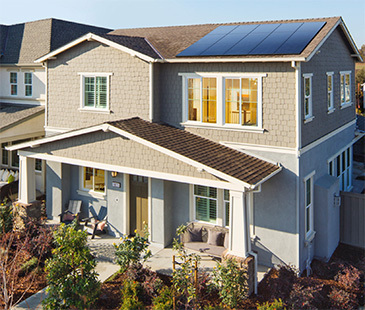Why Choose a Battery without Backup?
A battery without backup can be a great choice for those looking get more out of the solar energy they produce from their rooftop, without the higher price tag of a solar battery system with backup. One big perk: having the ability to capture any excess solar energy produced during the day for use in the evening when utility rates are typically most expensive (also known as peak-time rates).
A battery system without backup is becoming more popular in areas like California where net energy metering (NEM) programs incentivize utility customers generating their own clean energy to send the excess energy back to the grid in exchange for credits on their electric bills.1 In December of 2022, an update to the NEM policy in California reduced the rates for these credits, making it often more beneficial for homeowners to use the excess energy they collected during the day to power their home in the evening rather than sending it to the grid for credits.2
Terms to know
The concept of a solar battery system without backup is a newer one, so you’re likely to encounter a variety of different terms used to explain its benefits and capabilities. Below are some of the ways you may see this type of battery system described:
Grid-Tied: When a battery system is described as “grid-tied”, it’s a reference to the fact that the battery will not offer power to your home during an outage. It can only function while the electrical grid is up and running.
Off-Grid: When a battery system is described as having “off-grid” capabilities, that’s an indication that it is capable of producing backup power during an outage.3
Energy Management System: If the solar battery is referred to as an energy management system, it could mean the system comes without backup capabilities, but it’s a good idea to ask your solar provider to be sure.
Peak-Time or Time-Of-Use (TOU) Rates: These terms both refer to the higher costs your utility company may charge for electricity when demand rises. Both solar batteries with and without backup can provide increased savings by prioritizing the use of your stored energy during these times to avoid or minimize incurring the higher charges.
Self-Consumption: When you’re using more of the solar energy you produce from your roof to power your home at night or when the sun isn’t shining, rather than sending it back to the grid, you are prioritizing self-consumption of your solar energy. This is when solar battery systems without backup can be most beneficial.
What is the best solar battery system for your home?
Choose the solar battery system that will best meet your goals to use, save, and/or sell your solar energy all while reducing your carbon footprint. Whether you need solar power for more hours or power during an outage, there are great options to help you make the most of the energy your solar system produces. Learn more about the capabilities and differences between batteries with and without backup.
1 Ability to receive a credit for excess solar energy sold back to the grid varies by location. 2 The ability to power devices during peak times will vary depending on the amount of energy stored in the battery, the amount of wattage used by the appliances and devices powered by the battery, the ability to recharge during daylight hours, the frequency and duration of usage, and other factors. The battery storage system should not be relied upon as a single source of power for critical medical devices. 3 The ability to power devices during an outage will vary depending on the amount of energy stored in the battery, the amount of wattage used by the appliances and devices powered by the battery, the ability to recharge during daylight hours, the frequency and duration of usage, and other factors. The battery storage system should not be relied upon as a single source of power for critical medical devices.

